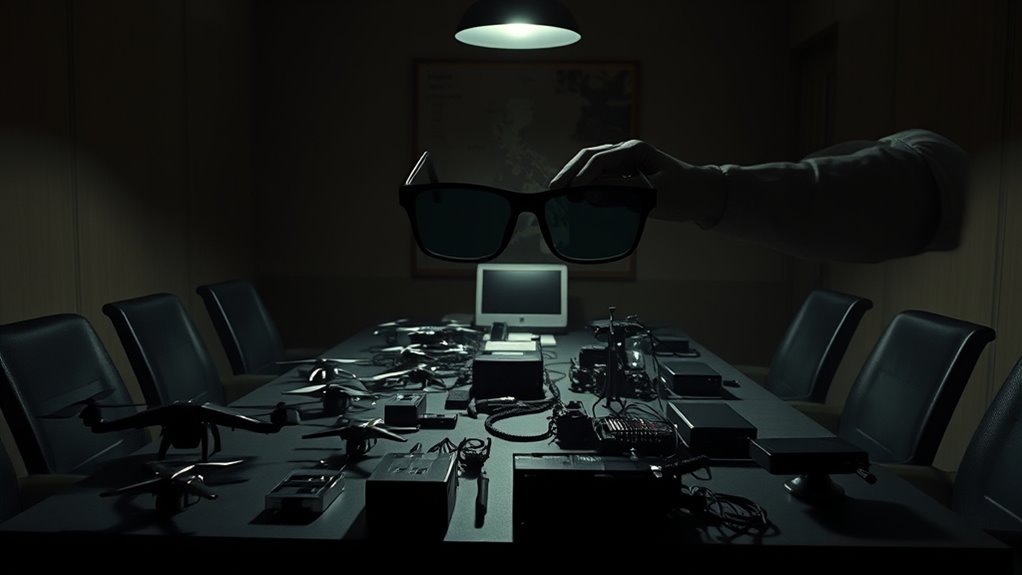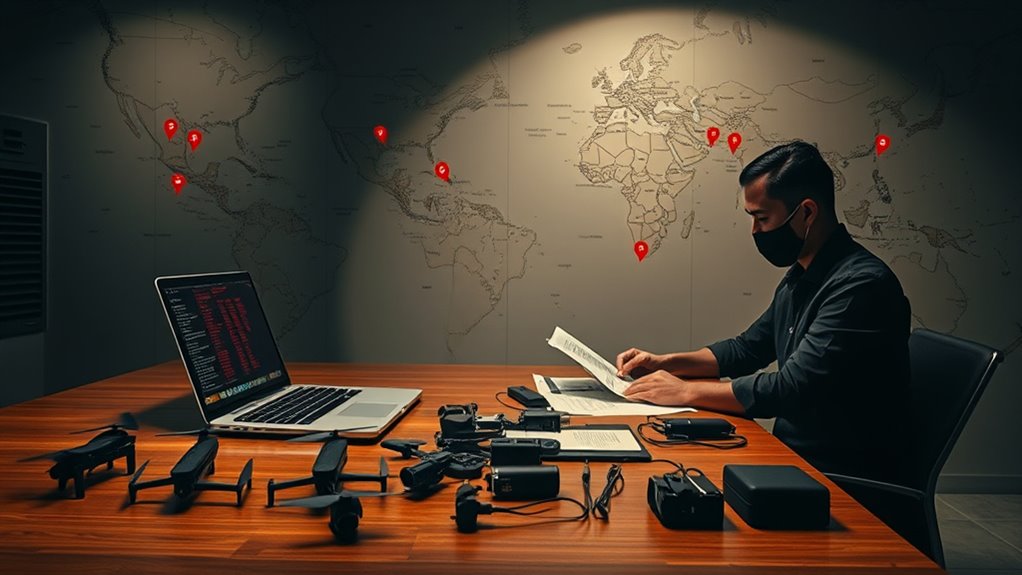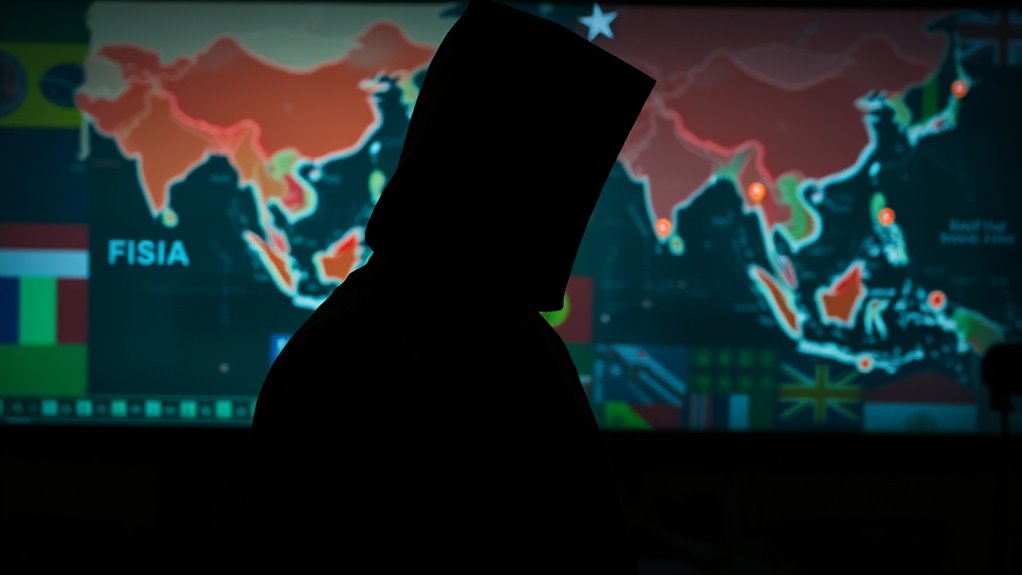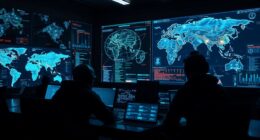Espionage in the Philippines is evolving rapidly as we approach 2025. With foreign nationals being recruited for intelligence operations, their local connections enhance effectiveness. Advanced techniques and tools, like drones and LiDAR, are transforming surveillance efforts in strategically important regions. Legal frameworks are struggling to keep pace with these advancements, highlighting significant national security risks. If you want to uncover more about the intricate world of Filipino spycraft and its implications, there’s much more to discover.
Key Takeaways
- Rising tensions in the Philippines have led to increased espionage activities, particularly involving foreign nationals recruited for intelligence operations.
- Advanced technologies, such as drones and LiDAR, are being utilized for detailed surveillance and mapping of key military facilities.
- Financial incentives, including monthly payments and bonuses, drive local participation in espionage activities, enhancing operational effectiveness.
- Strategic locations, like Subic Bay and Antonio Bautista air base, are primary targets for covert surveillance operations due to their military significance.
- Ongoing legal updates are necessary to address evolving espionage methods and ensure the protection of sensitive information.
Overview of Recent Espionage Cases in the Philippines

As tensions rise between China and the Philippines, recent espionage cases shed light on the complex dynamics at play.
China’s arrest of three Filipinos for alleged spying underscores the escalating surveillance efforts between the two nations. This move followed a Philippine operation targeting Chinese nationals suspected of monitoring U.S. and Philippine Navy activities.
Philippine authorities stress the urgency of enhancing security measures and legal frameworks to combat these threats. With China’s advanced surveillance network, identifying and prosecuting espionage has become more efficient.
Meanwhile, officials are verifying the reports of the arrests and evaluating Filipino nationals’ involvement. The evolving landscape of espionage demands coordinated responses to safeguard national security and maintain stability in regional relations.
The Role of Foreign Nationals in Espionage Activities

Recent espionage cases highlight the significant role foreign nationals play in intelligence operations within the Philippines.
These individuals often get recruited and trained by local agencies, enhancing their effectiveness in covert missions. Financial incentives, such as monthly payments and bonuses, motivate them to participate actively. Their local connections allow them to navigate the environment and language, making intelligence gathering more effective.
However, operating as foreign nationals comes with risks of detection. Collaborating with local accomplices further boosts their capabilities, while sophisticated tools aid data collection.
Ultimately, the involvement of foreign nationals complicates investigations, as authorities face the challenge of cross-border operations, making it essential to address this issue in national security strategies.
Techniques and Tools Utilized by Spies

Spies employ a range of advanced techniques and tools to carry out their covert operations effectively. They utilize sophisticated vehicles, like a Toyota RAV4 equipped with GNSS RTK systems, enabling precise geospatial mapping.
LiDAR technology helps create detailed topographical maps, while aerial drones capture images of sensitive military facilities. Solar-powered surveillance cameras provide real-time monitoring of military movements.
Additionally, technical intelligence (TECHINT) combines electronic surveillance with traditional methods to enhance data collection. Smartphones and laptops store and transmit gathered intelligence securely.
Real-time data transmission keeps operatives connected with their handlers, ensuring seamless coordination. By leveraging these advanced tools and techniques, spies can gather crucial information while minimizing the risk of detection.
Key Locations Targeted for Surveillance

Key locations across the Philippines serve as prime targets for surveillance, with operatives meticulously mapping military and civilian infrastructure.
In North Luzon, areas have been identified for their strategic importance, while the Bicol region sees expanded monitoring.
Subic Bay and Manila are vital for observing both military and civilian activities.
Air bases like Antonio Bautista in Puerto Princesa are under close scrutiny, with drones gathering high-resolution images of aircraft.
Air bases, such as Antonio Bautista in Puerto Princesa, face intense surveillance, with drones capturing detailed images of military aircraft.
Naval facilities, including the Subic Bay Naval Base, are monitored to disrupt maritime security.
The Subic Bay Freeport Zone and other strategic ports also attract attention.
Techniques like LiDAR technology and operatives posing as tourists enhance the effectiveness of these covert activities.
Legal Framework Addressing Espionage

Espionage laws play an essential role in maintaining national security and protecting sensitive information. In the U.S., the Espionage Act prohibits unauthorized sharing of classified data, while the Economic Espionage Act addresses corporate espionage.
Although there’s no universal international law on espionage, principles like sovereignty apply. Jurisdictional challenges often complicate legal actions, especially in cyber espionage cases.
If caught, individuals face severe penalties, including imprisonment and hefty fines, while corporations may suffer significant financial repercussions. Additionally, reputational damage can haunt businesses involved in espionage.
Continuous legislative updates are necessary to keep pace with evolving espionage methods, ensuring that laws remain effective in combating both individual and corporate threats.
International Reactions and Diplomatic Implications

As tensions escalate in Southeast Asia, the international community watches closely, aware that the diplomatic fallout from recent espionage cases could reshape regional dynamics.
Relations between the Philippines and China are deteriorating, fueled by mutual distrust and military activities near Taiwan. The U.S. is strengthening ties with the Philippines, possibly provoking China further.
This rivalry may delay essential joint development projects and lead to increased military presence in contested areas. Economic sanctions could emerge as diplomatic relations worsen, affecting overseas Filipino workers in China.
As these tensions rise, the handling of espionage allegations will greatly influence future diplomatic strategies and regional stability, making international reactions critical to traversing this complex landscape.
National Security Risks and Concerns

Rising tensions in Southeast Asia highlight the urgent need to address national security risks in the Philippines.
You face numerous internal security threats, including political instability and the challenges posed by the Bangsamoro peace process. Upcoming elections raise concerns about violence and foreign interference, putting pressure on security forces.
Cybersecurity’s a pressing issue too, with over 80% of companies experiencing threats and legislative gaps hindering effective responses.
China’s aggressive maneuvers in the South China Sea threaten your sovereignty, necessitating a strong national security strategy and a robust U.S.-Philippines alliance.
As geopolitical pressures mount, enhancing cybersecurity and addressing internal stability will be vital for safeguarding national interests and ensuring a secure future.
Future of Espionage and Counterintelligence in the Region

While geopolitical tensions escalate, the future of espionage and counterintelligence in Southeast Asia is likely to evolve rapidly.
You’ll notice a shift towards open-source and living-off-the-land techniques, making operations more adaptable and cost-effective. Threat actors will likely use reverse proxy tools to conceal their activities while deploying remote access trojans like PlugX to breach systems.
Expect prolonged dwell times in compromised networks, highlighting the need for robust counterintelligence strategies. Investing in talent pipelines and regional partnerships will be essential for enhancing cybersecurity.
Additionally, advancements in AI could transform espionage tactics, necessitating proactive monitoring and the development of AI-driven countermeasures. Balancing economic interests with national security will remain a pressing challenge for the region.
Frequently Asked Questions
How Do Spies Recruit Local Informants in the Philippines?
Spies often recruit local informants in the Philippines through online deception, using fake job offers and social media ads to attract individuals, especially former military personnel.
They offer enticing wages to lure you into roles that might support covert activities. By leveraging local networks and targeting government employees with access to sensitive information, they can gain valuable insights and connections, ultimately creating a network of informants for their operations.
What Motivates Individuals to Engage in Espionage Activities?
Imagine a moth drawn to a flickering flame.
People engage in espionage for various reasons: the allure of financial security, the desire to champion a cause, or the pressures of coercion.
Some seek the thrill of adventure, while others succumb to emotional manipulation.
Whether motivated by greed, ideology, or ego, these individuals often find themselves trapped, just like that moth, caught in a dangerous dance that could lead to their downfall.
Are There Any Notable Historical Espionage Cases in the Philippines?
You might find several notable historical espionage cases in the Philippines intriguing.
For instance, Leandro Aragoncillo, a former U.S. Marine, was convicted for leaking classified information.
Additionally, in 2025, several Chinese nationals were arrested for spying and mapping military bases.
The Alice Guo case, involving a Philippine mayor allegedly working for China, further illustrates the complexities of espionage in the region, highlighting the ongoing international intrigue surrounding the Philippines.
How Does Espionage Impact Everyday Citizens in Affected Areas?
Espionage’s eerie effects extend into everyday existence, impacting you in profound ways.
You might face privacy invasions that foster fear and suspicion, eroding trust in your community. Economic repercussions could shake local jobs, as industries suffer from intellectual property theft.
You’ll likely witness growing government surveillance, which can feel invasive. Ultimately, these clandestine activities can create a climate of chaos, affecting not just your security, but your sense of belonging in society.
What Counterintelligence Measures Are Being Implemented by the Philippines?
You’ll find that the Philippines is implementing several counterintelligence measures to enhance national security.
The National Intelligence Coordinating Agency (NICA) plays an essential role in directing these efforts, especially in cybersecurity.
Joint committees are coordinating strategies between the Armed Forces and police.
Intelligence sharing with allies like the U.S. is also on the rise.
Additionally, there’s a strong push for better legal frameworks to support these initiatives and tackle emerging threats effectively.
Conclusion
In the shadowy world of espionage, the Philippines stands at a crossroads, where secrets intertwine with national security. As covert networks evolve, you must recognize the delicate balance between vigilance and trust. The dance of spies will continue, but it’s up to you to stay informed and engaged. By understanding these dynamics, you become a significant player in safeguarding your nation’s future—because in this game of intrigue, knowledge is your best ally.









